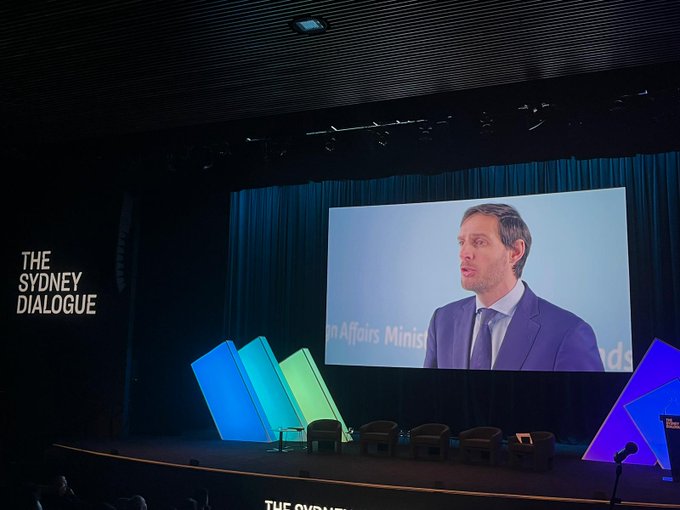
All our countries have long benefited from open economies. We trade freely, exchange ideas and innovate across borders. But as we’re all aware, the geopolitical climate is rapidly changing. Some countries increasingly use geoeconomics as an instrument to undermine others, and they seek to undercut the open system which has done so much for global progress and prosperity.
Today we’re talking about a crucial element of this global shift, game-changing technologies. And I would like to thank our Australian hosts for organising the Sydney Dialogue and for once again bringing together this group of global leaders in technology and in security. It is of vital importance that we’re having this conversation and that we do find the best possible way to strengthen international cooperation and to stimulate new technologies, which also preserve our security. Because our open economies are being challenged by geopolitical competitors in both overt and covert ways.
And this challenge to our collective economic security requires a joint response. Strong cooperation, truly strong cooperation between the Indo-Pacific and the Euro-Atlantic is, in my view, essential for this. We in Europe can learn a lot from the longstanding experience of the Indo-Pacific region on reducing strategic dependencies and mitigating risks. And that is why the Netherlands proposes a deeper cooperation on economic security with a focus on protecting knowledge, investment screening and anti-coercion.
We are being challenged and we need to increase our common understanding of this challenge. We must think about establishing international norms of acceptable behaviour like we actually achieved in the cyber domain. And finally, we do need to ask ourselves how we should organise ourselves for success and decide on joint responses on consequences for those who violate established norms and who infringe on our interest. And for this, we need a joint and systematic approach based on our common interests.
This approach is particularly necessary in the field of game-changing technologies, in the economic, the political and the military domains. And we must understand, anticipate and respond to the immense challenges and opportunities these technologies bring. Information has always been power, but now it’s being weaponised like never before by states and non-state actors. New technologies, be it quantum, artificial intelligence or photonics, go way beyond the reach of existing laws, and technological changes outpace regulatory responses.
So creating globally agreed-upon rules and norms and better coordinating our responses is truly vital. That is why the Netherlands organised the first global summit on responsible artificial intelligence in the military domain. And we’re also increasing our investment screening on critical technologies, reinforcing export controls and improving our knowledge security. And let’s be open about this. None of us can do this alone. We must all work together, governments, companies and civil society, because together we can promote, protect and shape the strategic environment.
We have all benefited from the open world. And now that it is rapidly closing, we must adapt and do what we can to ensure that the exchanges between us trusted partners remain as open as possible. Together we can maintain the right balance between protection and innovation, and we can provide global leadership on norms and be at the very forefront of the next phase of disruptive technology. We must protect our open democratic societies and economies, not by decoupling, but by de-risking. And, to paraphrase our Australian hosts, by building values, security and prosperity.

